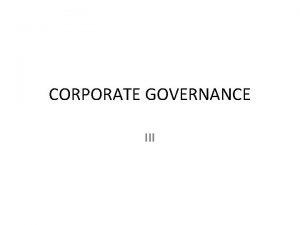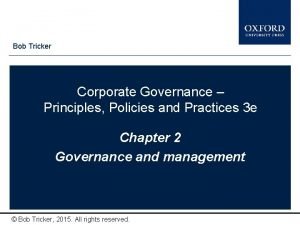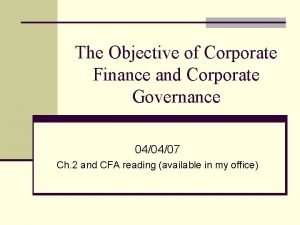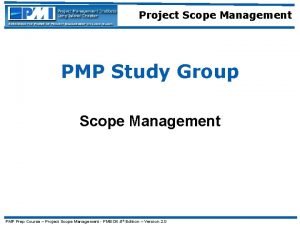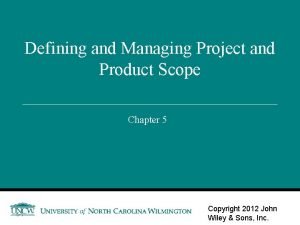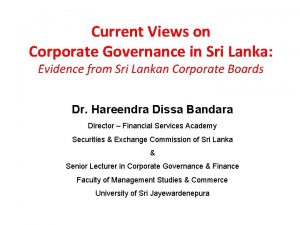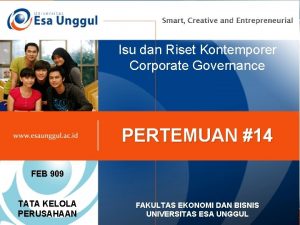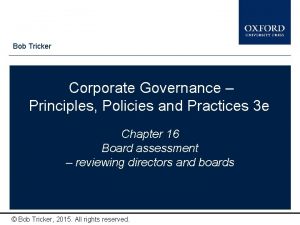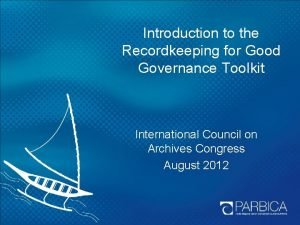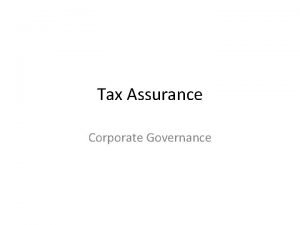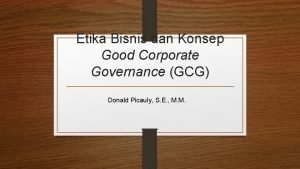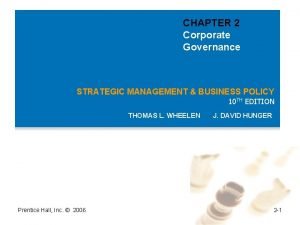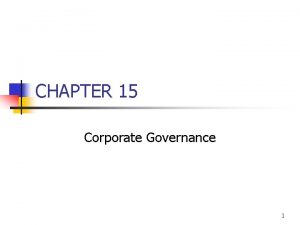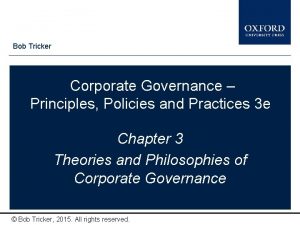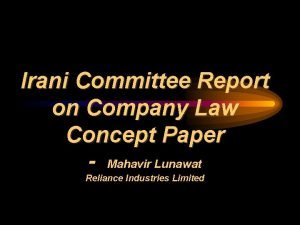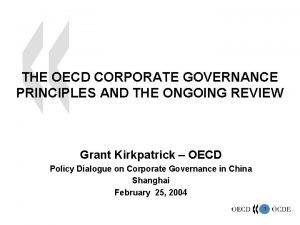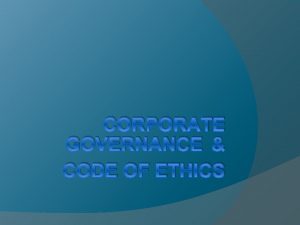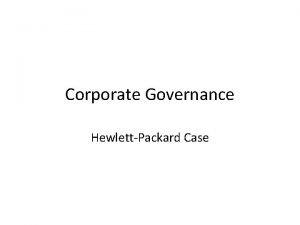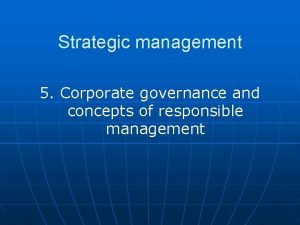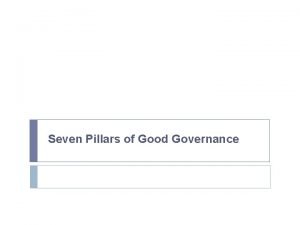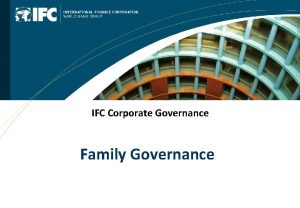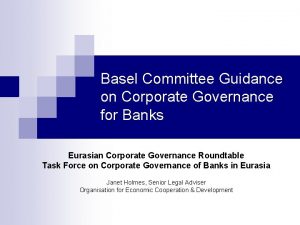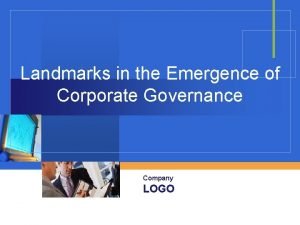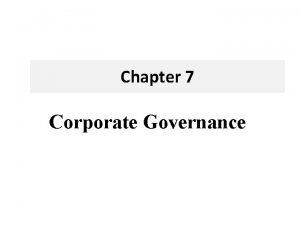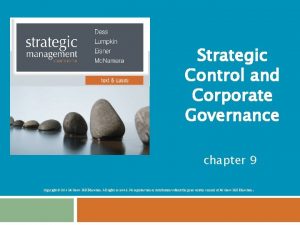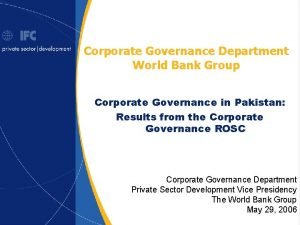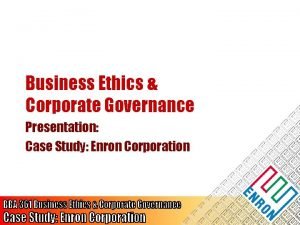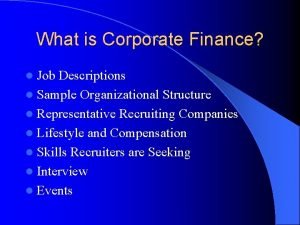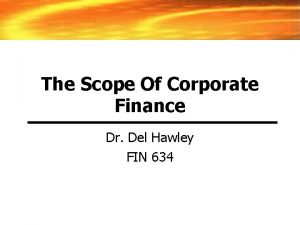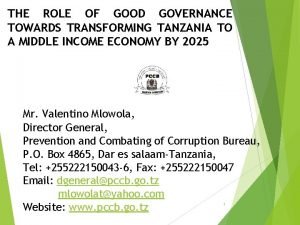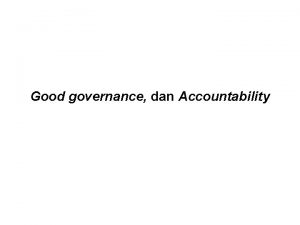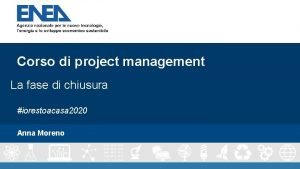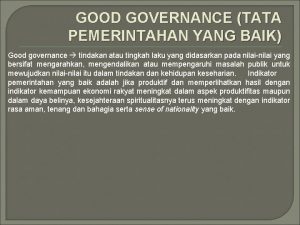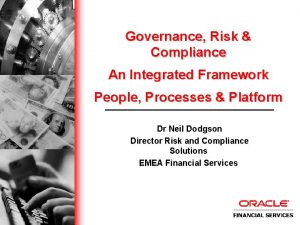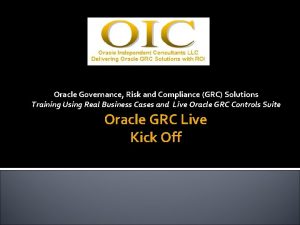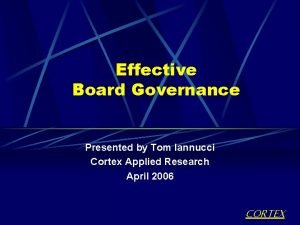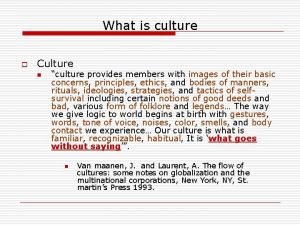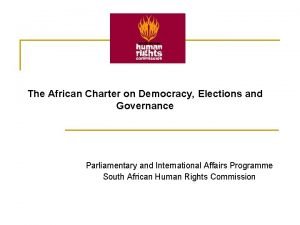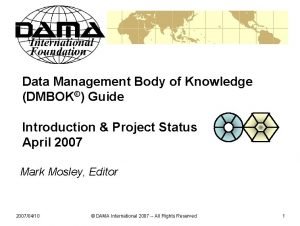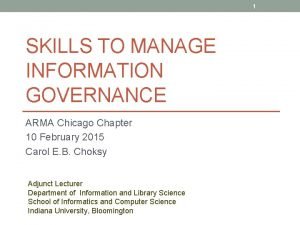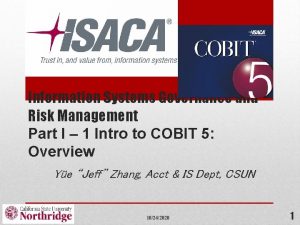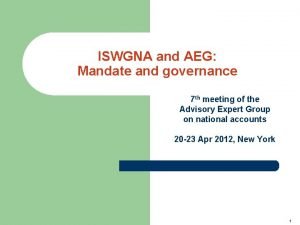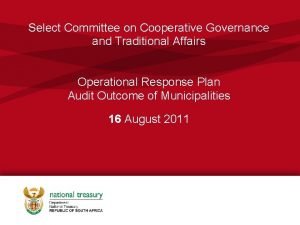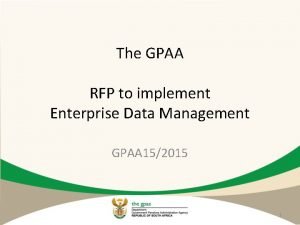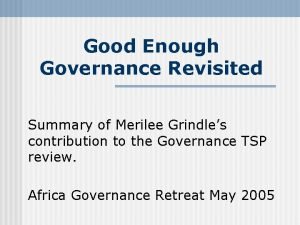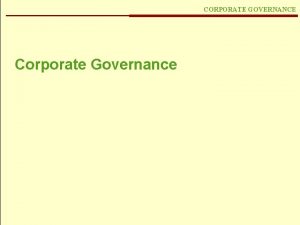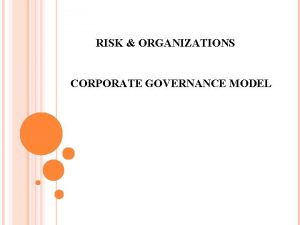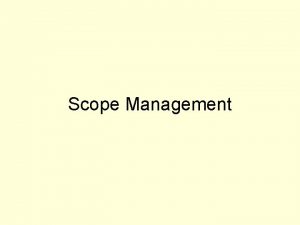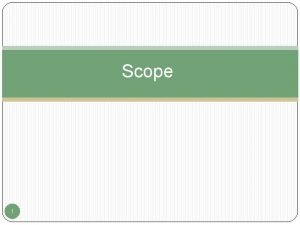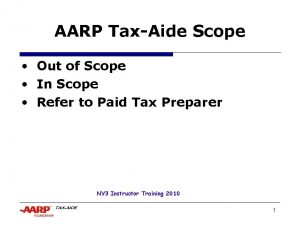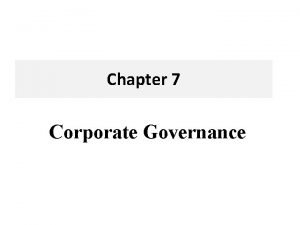CORPORATE GOVERNANCE III SCOPE OF CORPORATE GOVERNANCE III







































































































- Slides: 103

CORPORATE GOVERNANCE III

SCOPE OF CORPORATE GOVERNANCE III MEMBERSHIP • MEETINGS • RESOLUTIONS

SCOPE 1: MEMBERSHIP OF A COMPANY • A member is a person who has subscribed the memorandum of a company or any person who has agreed in writing to become a member of a company and whose name is entered in the register of members. • Section 79 (1) (2) CAMA

1. Subscriber to memorandum A subscriber to the memorandum becomes a member on the incorporation of the company. They are deemed to have taken the shares set opposite their names.

Other Members • Every person other than subscribers must meet two conditions to become a member of a company A. An agreement in writing to become a member: and B. Entry of his name in the register of members.

HOW TO ACQUIRE MEMBERSHIP • 1. Subscription: only available to the first subscribers, promoters • 2. Allotment & being placed on the register of members • 3. Transfer of shares from existing shareholders and being placed on the register of members • 4. By Transmission i. e by succeeding to the estate of deceased/bankrupt member, and being placed on the register of members.

ALLOTMENT and TRANSFER of shares. ALLOTMENT is the application for shares in a company by desirous members of the public. The company where it accepts the offer, will allot shares to that person. • Within 42 days of allotment, the company writes a letter of Allotment to the applicant notifying him of the allotment and the number of shares allotted to him • SECTION 125 (1) CAMA The company shall within 2 months after allotment, issue a certificate of Allotment to the allotee. Section 146 (1)

TRANSFER OF SHARES • is the assignment of sale of shares held in a company by the holders of the shares called Transferor or to another person with whom agreement has been reached known as the Transferee For a gift or upon consideration • Upon the transfer, steps are taken to register the transfer with the company so that the name of the transfer is substituted with the name of the transferee. Se 152

• It is possible to transfer only part of the shares held by a member and the member would still retain the share certificate where all the shares belonging to a member are transferred, a new share certificate shall be issued to the transferee within 3 months

Rectification of the Register of members • Se 90 CAMA • The Transferee should first notify the company that he is the holder of the shares in question. Where the company does not respond to this notification, the Transferee may apply to the court for rectification of the Register of members. Which Court? • By Motion

TRANSMISSION OF SHARES • occurs where the shares of a deceased shareholder or shareholder who is bankrupt devolves or transmits to the successors in title or his personal representatives. Se 155 • Automatic & Operation of Law

Capacity as to Membership Ø COMPANIES : A company may take shares and be a member of another company and be attending the meetings of the other company by a representative authorised by resolution of its BOD. Sec 231 Ø A company in liquidation is not capable of becoming a member of a company. S 20 (3) Ø ALIENS An alien may join in forming a company or acquire shares in a company but must comply with the laws relating to alien participation. Ø Enemy Alien & Infant.

INCIDENTS /RIGHTS OF MEMBERSHIP • Right to dividends ( Debts due & recoverable) • Right to bonus shares if declared (shares at premium) • Right to attend meetings. Longe v 1 ST BANK • Right to receive notice of meetings • Right to vote at meetings and be voted for • Right to demand poll • Right to appoint proxy • Right to requisition Extra-ordinary general meeting

• Right to own shares • Right to transfer shares • Right to sell, mortgage or otherwise dispose of shares • Return of capital on reduction of capital/winding up if there is surplus • Right to object to alteration of objects clause, shares etc • Right to take up minority action • Right to petition for investigation by CAC, SEC

• • • Right to petition for winding up Right to copies of memo and articles Right to financial Reports Right to inspect minutes of meetings Right to remain a member unless restructured out and shares acquired.

Current trends in Codes of Corporate Governance Not more than 5% shares in the Banking Sector

CESSATION OF MEMBERSHIP • TRANSFER • FORFEITURE OF SHARES • RIGHT AND EXERCISE OF LIEN BY COMPANY

MEETINGS Types of General meetings of a company 1. Statutory meeting 2. Annual General Meeting (AGM) 3. Extra – Ordinary General Meeting (EGM)

STATUTORY MEETING: S 211 • Every public company shall, within a period of six months from the date of its incorporation, hold a general meeting of the members of the company to be referred to as the “Statutory Meeting” PLC ONLY

Facts to Note About Statutory Meeting Ø Solely for Public Companies (PLC) Ø It is compulsory Ø It is to hold within 6 months of the date of incorporation of the company Ø It must be held in Nigeria S 216 Ø Notice must be sent to members at least 21 days before the meeting S. 217(1)

Business Transacted at Statutory Meeting • The members of the company present at the statutory meeting may • i. Discuss any matter relating to the formation of the company and commencement of business • ii. Consider the statutory Report • iii. Consider matters arising from the statutory report

SECTION 211 (8) STATUTORY REPORT • The directors shall, at least 21 days before the day on which the statutory meeting is held forward to every member of the company statutory report. S. 211 (2) • The statutory report shall be certified by not less than two directors or by a directors and the secretary of the company S. 211(3) • The directors shall also deliver a copy of the statutory report so certified, to the CAC S 211(6)

Contents of Statutory Report • 1. The total number of shares allotted, either as fully paid up, party paid up or partly paid up otherwise than in cash; for shares partly paid up the extent to which they are so paid up, or the consideration for which they have been allotted. • 2. The total amount of cash received by the company in respect of all the shares allotted, distinguished as aforesaid. • 3. The names, address and descriptions of the directors, auditors, managers, if any, and secretary of the company.

• 4. The particulars of any pro-incorporation contract together with the particulars of any modification or proposed modification • 5. Any underwriting contract that has not been carried out and the reasons therefore • 6. The arrears, if any due on calls from every director

• 7. The particulars of any commission or brokerage paid or to be paid on the issue or sale of shares or debentures to a director or manager S. 211(3) • 8. An abstract of the receipts of the company and of the payments made form them up to date. S. 211(4) • 9. The statutory Report as it relates to shares and capital account (receipts & payment shall be certified by the auditors S. 211

Resolution on Statutory Report • By S. 211(9) CAMA, if a member wishes to propose a Resolution on any matter arising out of the statutory report, from the date of his receipt of the statutory report, he must give a further 21 days notice to the company, of his intention to propose such a resolution in the general meeting.

Penalty on Failure to hold statutory meeting /deliver statutory Report • Non-compliance and penalty on Failure to hold statutory meeting or deliver statutory Report would result to 1. The company and any officer in default shall be guilty of an offence and liable to a fine. • Section 212 2. Winding up of the company by the court • S. 408 (b) CAMA (Discretion of Judge)

ANNUAL GENERAL MEETING Section 213 • Every company shall in each year hold a general meeting as its annual general meeting a addition to any other meeting in that year and shall specify the meeting as such in the notice calling it and not more than 15 months shall elapse between the date of one AGM of a company and that of the next.

Essential features of AGM • It is compulsory for all companies • A company should hold its first AGM within 18 months of incorporation • Not more than 15 months may elapse between the date of one AGM and the next but so long as a company holds its first AGM within 18 months of its incorporation, it need not hold it in that years or in the following year – S. 213(1)(a)

• Apart from the first AGM, CAC can extend the time of holding any subsequent AGM by not more than 3 months S. 213(1) (b) • The AGM must be held in Nigeria S 216 • Notice must be sent to members at least 21 days before the meeting but shorter notice is allowed if agreed to by all the members entitled to attend and vote S. 217(2) (a)

Procedure/Power of CAC to compel BOD to Hold AGM • i. A member can apply to the CAC urging the CAC to call or director calling of a meeting. • ii. If a member’s application is timely and the CAC grants the order to hold the meeting in that year, the meeting is an AGM of that same year. • However, where a meeting so held is not held in the year in which the default in holding the AGM occurred, the meeting is not to be treated as the company’s AGM of the previous year in which it is held, unless at that meeting the company resolves that it shall be so treated S. 213(3)

• iii. The CAC can also give a direction that one member of the company present in person or by proxy may apply to the Federal High Court for an order to take a decision which shall bind all the members S. 213(2

PENALTY FOR NON-COMPLIANCE • The company and every officer who is in default shall be guilty of an offence and be liable to a fine • S. 213(5)

Business Transacted at Annual General Meeting • Two types of businesses are transacted at the AGM of a company A. Ordinary Business B. Special Business.

ORDINARY BUSINESS OF AGM Declaration of dividend ii. Presentation of the Financial Statement – the Report of Directors and Auditors iii. Election of directors in place of those retiring iv. Appointment of Auditors v. Fixing of remuneration of the auditors vi. Appointment of members of the Audit committee • i. • • •

B. SPECIAL BUSINESS OF AGM • Any other business not listed as ordinary business of AGM is deemed special business of AGM SECTION 214

EXAMPLES OF SPECIAL BUSINESS a) b) c) d) e) To alter the object/ memart Change of Name Re registration of all types Reduction of capital Removal of auditor before expiration of tenure f) etc

EXTRA-ORDINARY GENERAL MEETING Section 215 • Extra-ordinary General Meeting (EGM) is the General meeting held at any time to transact business that cannot comfortably wait for the next Annual General Meeting (AGM).

TIME AND PLACE FOR EGM • An EGM can hold at any time and • Need not hold in Nigeria – S. 216 • As many as possible and desirable

WHO CAN CONVENE AN EGM? • i. Board of Directors • ii. Any Director if other Directors are not within Nigeria & quorum may not be formed for BOD • iii. Requisition by members holding not less than one tenth of the paid up share capital of the company, carrying the right of voting

• IN CASE OF LIMITED BY GURANTEE? or in the case of a company without a share capital, members holding one-tenth of the total Voting rights of all the member.

PROCEDURE FOR MEMBER’S REQUISITIONED EGM • The Requisitionists qualified as described in (iii) above must deposit assigned requisition at the registered office of company, stating “the object of the meeting” : the Resolution which they intend to propose. S. 215(3)

Where Directors Fail to Convene? • If the directors do not within 21 days from the date of the deposition of the requisition proceed duly to convene a meeting, the requsitionists, or any one or more of then, representing more than ½ of the total voting rights of all of them, may themselves convene a meeting. Section 215 (4)

Expenses incurred by Requisitionist • Any reasonable expenses of the requisitionist in convening the meeting shall be repaid to the requisitionist by the company Section 215(6)

Absence of Quorum at a requisited Meeting? • If no quorum is present at the requisitioned meeting, within one hour from the time appointed for the meeting, it is dissolved. i. e. that would be the end of the matter, there is no adjournment. • Section 239 (3) AMG

Business Transacted at Extra-ordinary General Meeting • By section 215 (8) CAMA, businesses transacted at an extra-ordinary general meeting shall be deemed “Special Business”. • Therefore, a matter which constitutes ordinary cannot be discussed at EGM. • Query: Removal & appointment of a director in EGM. ? Removal is possible, leading to casual director

COURT – ORDERED MEETING Section 223 • The Federal High Court can upon an Application, by interested party, order a company’s meeting in the following circumstance. q If for any reason it is impracticable to call a meeting of a company or q for the Board of directors in any manner prescribed by the Articles or CAMA.

ORDERS COURT MAY MAKE Upon the application of any director of the company or of any member of the company who would be entitled to vote at the meeting the court can make all or any of the following orders. A. That the meeting be called, held and conducted in any manner it thinks

B. Give such ancillary or consequential directions as it thinks expedient including a direction that one member of the company present in person or by proxy may apply to the court for an order to take a decision which shall bind all the member S 223(2)

• The directions should be confined to matter that will facilitate the meeting and the court should not pronounce on matters reserved for the meeting.

In case of absence of all Directors& Shareholders. • Where all the directors and shareholders does not/ are dead, any of their personal representatives can apply to the court for an order to convene a meeting of all the personal repr. of the shareholders entitled to attend and vote at a general meeting to appoint new Directors to manage the company and if they fail to convene a meeting the creditors, if any can do so. Section 248 (2)

ISSUES /VALID CONVENING OF MEETING • The issues affecting the validity of a meeting bother mainly on notification and how to notify, where and who attends the meetings

such issues are: 1. Venue of meeting 2. Eligibility to attend, 3. Notice of meeting, 4. Proxy attendance and 5. Corporate Representation

VENUE OF MEETING • By virtue of Section 216 CAMA, company meetings that must be held in Nigeria are Statutory meeting and Annual General meeting. • Thus, Extra-ordinary general meeting needs not hold in Nigeria

ELIGIBILITY TO ATTEND COMPANY MEETING. S 219 • Entitled to receive Notice and eligible to attend: • 1. Every member • 2. Legal representative, receiver or a trustee in bankrupt of a member • 3. Every director of the company • 4. Every auditor of the company • 5. Company Secretary • Apart from the listed person, no other person is entitled to receive Notice of GM. S 219 (2)

AUDITOR? • Section 363 (1) CAMA reconfirms the fact that a company’s auditor shall be entitled to attend any general meeting of the company and to receive all notices

NOTICE OF MEETING • No business may be transacted at any GM unless notice of it has been duly given. Se 218. Contents of Notice. Se 218 • A valid notice of a meting must specify 1. The place of the meeting 2. The type of meeting 3. Agenda ie general nature of the business to be transacted

• For AGM, it is to be stated in the Notice, that the meeting is to transact “Ordinary Business” and state them • For special Business, terms of the Resolution should be set out 4. Provision should be made for proxy attendance 5. It should be expressed to be by ORDER OF THE BOARD or REQUISIONED BY MEMBERS 6. Signed by company secretary 7. Time 8. Date

Length of Notice Section 217 • The notice required for all types of general meetings shall be 21 days from the date on which the notice was sent out. • However, a shorter notice may be agreed by all the members entitled to attend and vote at the AGM or by members represents 95% of the voting rights /shares for other General meetings. Section 217 (2)

Service of Notice Section 220 • A notice may be served personally or by post to the person entitled or to his registered address or if he has not registered address within Nigeria to the address if any supplied by him to the company for giving of notice to him. • Where a notice is sent by post and the letter is properly addressed and stamped, then the addressee is deemed to receive it 7 days after the letter is posted: section 220 (2) • Thus, the 21 days is calculated from that time

Failure To Give Notice Section 221 • Failure to give notice of meeting to a person entitled to receive it shall invalidate the meeting. • The exception is where such failure is an accidental omission on the part of the persons giving the notice. 1 st Bank v Longe • However, if the failure was due to a misrepresentation or misinterpretation of the provisions of CAMA or the Articles this shall not amount to accidental omission. – section 221 (2)

Instances of Additional Notice section 222 CAMA • In addition to the normal individual notices sent out, every Public company (PLc) shall, at least 21 days before any (General meeting) • Advertise a notice of such meeting in at least two daily Newspapers

Current trend in Corporate Governance • Adequate notice • Service of notices • Proof of services

PROXY • Proxy means a person nominated by any member to attend a accompany meeting on his behalf, takes part in the voting and can exercise the same right as the member appointing him. • NB: That member who appoints a proxy must be entitled to attend and vote at the meeting. • A proxy may not be a member of the company Se 230 (1) • Proxy is not allowed in company without share capital unless its Articles permit. Proviso to Section 230 (1)

How Proxy is appointed • Notice must provide for members right to appoint proxy Se 230 (2). Breach of this constitutes on offence Section 230 (2) • The instrument appointing a proxy shall be in writing under the hand of the appointer or of his Attorney duly authorized in writing. If the appointer is a corporation, the proxy instrument shall either be under seal or under the hand of an officer or Attorney duly authorized. Se 230 (6) • The proxy instrument shall be deposited at the registered office or head office of the company or at such other place within Nigeria as is specified for that

Revocation of proxy’s appointments • Proxy form /instrument is to be lodged not later that 48 hours before a meeting section 230 (3) • It has to be deposited NOT LATER than 24 hours before the time appointed for the taking of poll Section (7) The appointer may have a change of mind after appointing; • He is allowed to revoke the Proxy and attend the meeting But unless he has successfully revoked the Proxy, he can no longer be allowed in the meeting as he could have double attendance.

• For the proxy to be validly revoked, the Revocation must be communicated to the company. Timely before the commencement of meeting or adjourned meeting in which the Proxy is to be used • The revocation, transfer, death or insanity of principal does not affect proxy unless information in writing of such death etc has been receive by the company before commencement of the meeting. Section 230 (5)

CORPORATE REPRESENTATION • By S 231 CAMA a company which is a shareholder or member of another company is required to appoint any person by a Resolution of the Board or governing Council, to be it representative in the general meetings of the company of which it is a member.

• NB: Such a Representative is not thereby a Proxy and therefore exercise the right of the company- S 231 (2) e. g can appoint Proxy under S 230 (1) • A creditor company being a Debenture Holder of another company can also appoint a Representative to be attending the creditors meeting in the Debtor company. S 231 (1) (b)

ISSUES AFFECTING VALIDITY OF PROCEEDINGS AT MEETING • Examples of such issues touching on proceedings of the meeting include: Ø Quorum Ø Voting Ø Resolution Ø Adjournment Ø Minutes of Meting

QUORUM • Quorum refers to the total Nos of members present in person or by proxy, whose presence satisfies the required minimum number of members that would be present for the meeting to start & progressively proceed to the expected end.

How is Quorum determined? • Section 232 (1) CAMA provides thus Unless otherwise provided in the articles, no business shall be transacted at any general meetings unless a quorum of members is present at the time when the meeting proceeds to business and through out the meeting. • For the purpose of determining a quorum, all members or their proxies shall be counted Section 232 (3)

• Unless otherwise provided in the articles, the quorum for a meeting shall be • 1/3 of the total number of members of the company or 25 members (whichever is less) present in person or proxy • Where the number of members is not a multiple of 3, than the number nearest to 1/3 • Where the number of members is 6 or less, the quorum shall be 2 members. Section 232 (2) CAMA

THE RULE OF 1/3 & 25 • Unless otherwise provided in the articles, the quorum for a meeting shall be • 1/3 of the total number of members of the company or 25 members (whichever is less) present in person or proxy • Where the number of members is not a multiple of 3, than the number nearest to 1/3 • Where the number of members is 6 or less, the quorum shall be 2 members. Section 232 (2) CAMA

Quorum during the progress of the meeting • Unless the Articles otherwise provides, quorum is to be maintained from the starting of the business of the meeting and throughout the meeting. S 232 (1) • Where quorum was formed at the commencement of a meeting but the quorum was last as the meeting progressed, then the Chairman ought to direct on the fate of the meeting.

MEMBERS WITHDRAWAL? • The Chairman’s direction depends on whether the reason for withdrawal from the meeting was for “sufficient or insufficient Reason”

GOOD REASON? • If it is for sufficient reasons, the meetings shall be adjourned to the same place, and time in a week’s time. If there is no quorum still at the adjourned meeting. The member present shall be the quorum and their decision shall bind all shareholders. If only one member is present at the adjourned meeting, he may seek direction of the FHC to take decision S 232 (5)

MALICIOUS WALKING OUT • If it is for insufficient reason OR for the purpose of reducing the quorum the meeting can continue with the number present, and their decision shall bind all the shareholders and where it remains only one member, he may seek direction of the court to take a decision S 232 (4)

VOTING • Voting is done to ascertain the support of a particular Resolution by members. There are basically two types of voting at any General meeting I. Show of hand II. By demanding a poll. Sect 224 (1)

Show of Hand • This is voting according to the number of persons present and entitled to vote even by proxy. It is determined by counting the number of members supporting or opposing a Resolution.

Demand of a poll • Voting on a poll entails the shareholders voting according to the number of share he owns • Although one share attracts one votes, certain classes of share permitted to have weighted vote i. e. attracts more than one vote e. g. preferential shares Section 143 • Proxies also vote according to the number of shares which the member they are representing hold.

Procedure upon demand of poll • If a poll is duly demanded, the result of the previous show of hands is then disregarded. Poll shall be taken in such manner as the Chairman directs, and the result of the poll shall be deemed to be the Resolution of the meeting at which the poll was demanded S 226 (2) • However a poll demand on the election of a chairman or any question of adjournment shall be taken forthwith and any business other than that upon which a poll has been demanded may be proceeded with pending the taking of the poll. S 226 (4)

Restriction on demand of poll • The right to demand poll shall not be limited by Articles except on the Election of Chairman & Adjournment of meeting. Where the Articles limits the right, the Articles shall be void. Se 225 (1) • Company’s articles can validly restrict the use of poll voting in respect of election of the Chairman or Adjournment of meeting. • However, there SHALL BE NO RIGHT to demand on poll on the election of members of the Audit Committee under S 359 CAMA • This is an absolute bar S 225 (3)

Who can demand on polls • The following persons can demand on poll • i. The Chairman, where he is a shareholder or a proxy • ii. At least three members present in person or by proxy • iii. Any member or members present in person or by proxy and who represent not less than 1/10 of the total voting rights • iv. Any member or members holding shares not less that 1/10 of the total fully paid up shares in the capital of the company S 224 (1) a-d

Chairman’s Casting Vote • In the case of an equality of votes, whether on a show of hands or on a poll, the Chairman is entitled to a second or casting vote Se 226 (3)

Result of Vote • For show of hands, the Chairman’s declaration of the results is conclusive. Thus, no one can re-count hands after such declaration unless a poll is demanded. • An entry to that effect in the Minutes Book shall be conclusive evidence of the result, without proof of the number or proportion of the votes recorded in favour of or against the resolution Section 224 (2) • For poll, in competing the majority, the number of votes cast for and against the resolution should be counted.

RESOLUTIONS • Resolutions refer to decisions taken at the company meetings, arrived at through voting, or unanimous agreement by members entitled to vote. • Types of Resolution • There are two basic types of Resolutions • i. Ordinary Resolution • ii. Special Resolution

ORDINARY RESOLUTION • This is a resolution passed by a simple majority of votes cast by members bang entitles to vote either person or by Proxy section 233 (1)

WRITTEN RESOLUTION • Written Resolution is resolution passed without formal physical meeting of members who are entitled to attend the meeting & vote. S 234 Provides thus All resolution shall be passed at general meeting and shall not be effective unless so passed • Provide that in the case of a private company, a written resolution signed by all the members entitled to attend the vote shall be as valid and effective as if passed in a General Meeting. • Private Companies Only. • Be signed by All the members entitled to vote

SPECIAL RESOLUTION • This is a resolution passed by not less than ¾ (three-four) of the votes cast by such members being entitled to vote either in person or by proxy; of which 21 days notice, specifying the intention to propose the resolution as a special Resolution has been duly given • NB: Notice of less than 21 days may be given where members so agree. S 233 (2)

12 Examples of matters requiring special Resolution • • • 1. Change of Name S. 32 2. Alteration of the Articles S. 48 3. Alteration of objects s. 46 4. Reduction of capital s. 106 5. Voluntary winding up S. 457 6. Compulsory winding up s. 408

• 7. Re-registration of LTD as PLC s. 50 (1) • 8. Re-registration of PLC as LTD S. • 9. Rendering liability of Directors unlimited S. 289 • 10. Re- registration of ULTD as LTD S. 51 • 11. Variation of class rights S. • 12. Payments of interest out of capital S 113

RESOLUTIONS REQUIRING SPECIAL NOTICE • Special Resolution deals with the number of votes to be cast for a decision; whereas Special Notice deals with how to inform those entitled to attend and vote on the Resolution. • The Procedure is: • The member gives special Notice of his intention to the company at least 28 days before the date of the meeting at which he intends to move the resolution is enclosed on the

• On receipt of the members notice as well as enclose the Resolution in the notice • Where the company fails to call a meeting for a date 28 days less after the notice has been given, this will not invalidate the meeting.

Examples of special notice • Examples of Resolutions that require special Notice are • 1. Appointment of a person other than a retiring Auditor • 2. Removing Auditor before expiration of his term of office Se 364 • 3. Appointing or re-appointing a Director aged more than 70 for a Public company Se 256 • 4. To Remove a Director from office S. 262

DATE OF PASSING OF RESOLUTION • Resolution passed at company meetings even on adjourned meeting shall be treated as passed on the date on which it was actually passed and not an earlier date. Section 238 • For written Resolution, it is deemed to be passed when the last signature is affixed to the resolution

REGISTRATION OF CERTAIN RESOLUTION • By S. 237 (1) (4) CAMA, printed copies of the following Resolution and agreement must be forwarded to CAC for registration within 15 days after the passage • Special resolution • Unanimous resolution on issue which requires special resolution • Unanimous class resolution • Resolution requiring a company to be wound up voluntarily under S. 457 (a) CAMA

REQUISITION OF RESOLUTION • Members holding 1/20 of the total voting rights in a company can requisition a notice of their Resolution on an issue, and cause the company to circulate it to members entitled to attend the meeting in which the resolution is proposed to be moved. S. 235(1) (4)

ADJOURNMENT OF MEETINGS SECTION 239 CAMA A meeting may be adjourned either because • 1. No quorum is formed at the original meeting or • 2. D Business was unfinished at the original meeting • The Chairman, may with the consent or directive from them at the meeting, adjourn the meeting from time to time and from place to place

• No new business is allowed at the adjourned meeting, only the unfinished business from the original meeting shall be transact. S. 239 (1) • It is not necessary to give notice of adjourned meeting if it is adjourned for not more than thirty days. where more, then notice must be given. S. 239 (2)

Quorum at Adjournment Meeting • If within one hour from the time an adjourned meeting is declared starts, a quorum is not present • If the meeting is convened upon the requisition of members, the meeting shall be dissolved • If not a requisitioned meeting, it shall stand adjourned to the same day in th 4 e next week, at the same time and place or such other day, time & place as directed by chairman or director S. 239 (3) • At the second adjourned meeting, any two or more members present shall form a quorum and their decisions shall bind all. • Shareholders; and if only one member is present, ; he may seek the direction of the court to take a decision S. 239 (4) S. 263 (4)

MINUTES OF PROCEEDINGS • Every company shall keep minutes of all proceedings of general meeting, Board meetings and meeting of its managers if any , SEC 244 (1) Where there is default, the company & every office in default shall be guilty of an offence & liable to a fine. S. 241 (4) • The Minutes when signed by the chairman of the meeting or the chairman of the next succeeding meeting, shall be prima facie evidence of the proceedings. S. 241 (3) • And that the meeting was duly held and convened, and matters agreed to the meeting are deemed to be valid – S. 241 (4)

Forms of Minutes • The minutes can be kept in any of the following forms • 1. Bound books • 2. Loose leaves • 3. Photographic film form • 4. Stored on any informative storage device capable of being reproduce into eligible written form e. g. Compact Disk (CD), Flash Drives etc.
 Scope of corporate governance
Scope of corporate governance Tricker corporate governance
Tricker corporate governance Corporate finance and corporate governance
Corporate finance and corporate governance Product scope vs project scope
Product scope vs project scope Io2br3
Io2br3 Corporate governance in sri lanka
Corporate governance in sri lanka Oecd principles of corporate governance
Oecd principles of corporate governance Sociological theory in corporate governance
Sociological theory in corporate governance Corporate governance clause 49
Corporate governance clause 49 Corporate governance lecture
Corporate governance lecture Staggered board structure
Staggered board structure Isu dan riset kontemporer corporate governance
Isu dan riset kontemporer corporate governance Corporate governance principles policies and practices
Corporate governance principles policies and practices What is corporate governance
What is corporate governance Cadbury report ppt
Cadbury report ppt Corporate governance definition
Corporate governance definition Corporate governance tool kit
Corporate governance tool kit Cmda corporate governance code
Cmda corporate governance code Oecd corporate governance definition
Oecd corporate governance definition Corporate governance definitie
Corporate governance definitie Makalah etika bisnis dan konsep good corporate governance
Makalah etika bisnis dan konsep good corporate governance Corporate governance strategic management
Corporate governance strategic management Potential problems in corporate governance
Potential problems in corporate governance Rules based approach to corporate governance
Rules based approach to corporate governance It means openness a willingness by the company
It means openness a willingness by the company Tricker
Tricker Objective of corporate finance
Objective of corporate finance Jj irani committee
Jj irani committee Oecd corporate governance principles
Oecd corporate governance principles Good governance and corporate social responsibility
Good governance and corporate social responsibility P&g code of conduct
P&g code of conduct Hp corporate governance
Hp corporate governance Corporate governance and economic growth
Corporate governance and economic growth Driving forces of corporate governance
Driving forces of corporate governance Corporate governance chain
Corporate governance chain Insider system of corporate governance
Insider system of corporate governance Chapter 10 corporate governance
Chapter 10 corporate governance Main pillars of good governance
Main pillars of good governance Family governance definition
Family governance definition Basel corporate governance
Basel corporate governance Paul ruthman committee
Paul ruthman committee Corporate governance reforms in india
Corporate governance reforms in india Latar belakang munculnya gcg di indonesia
Latar belakang munculnya gcg di indonesia What is corporate governance
What is corporate governance Informational and behavioral control
Informational and behavioral control Corporate governance department
Corporate governance department Corporate governance triangle
Corporate governance triangle Global corporate governance forum
Global corporate governance forum Enron scandal presentation
Enron scandal presentation Oecd guidelines for corporate governance
Oecd guidelines for corporate governance Corporate governance is a form of
Corporate governance is a form of Hamlet act iii scene ii
Hamlet act iii scene ii Corporate scope
Corporate scope Corporate finance job scope
Corporate finance job scope Scope of corporate finance
Scope of corporate finance Historical background of good governance in tanzania
Historical background of good governance in tanzania Pengertian good governance menurut world bank
Pengertian good governance menurut world bank Get-dlpcompliancerule
Get-dlpcompliancerule Governance issues in cloud computing
Governance issues in cloud computing Process governance
Process governance Governance di progetto
Governance di progetto Intelligence creation and use and bi governance
Intelligence creation and use and bi governance Good governance adalah
Good governance adalah Master data management strategy document
Master data management strategy document End user computing audit checklist
End user computing audit checklist It risk and compliance
It risk and compliance Kebijakan publik dan good governance
Kebijakan publik dan good governance It governance planning
It governance planning Oracle governance risk and compliance
Oracle governance risk and compliance Self service bi governance
Self service bi governance Tom iannucci
Tom iannucci Culture n
Culture n Forrester grc wave 2017
Forrester grc wave 2017 African charter on democracy, elections and governance
African charter on democracy, elections and governance Leisure
Leisure Pengertian good governance
Pengertian good governance Data governance roles and responsibilities matrix
Data governance roles and responsibilities matrix Communication with those charged with governance
Communication with those charged with governance Acnc governance for good
Acnc governance for good School based management principle 3
School based management principle 3 Dama dmbok summary
Dama dmbok summary Arma information governance
Arma information governance Information systems governance
Information systems governance Governance structure example
Governance structure example What is governance
What is governance Governance theme
Governance theme Malaysian patient safety goal
Malaysian patient safety goal Cooperative governance
Cooperative governance Agile data governance
Agile data governance Incumbency chart
Incumbency chart Data governance and risk management
Data governance and risk management Good enough governance
Good enough governance Slide to doc.com
Slide to doc.com Clinical governance postgraduate
Clinical governance postgraduate Rfp best practise
Rfp best practise Market governance
Market governance Good governance menurut laode ida
Good governance menurut laode ida Data governance tools ibm
Data governance tools ibm Good enough governance
Good enough governance Power bi governance and deployment
Power bi governance and deployment Develop new approaches to public governance and engagement
Develop new approaches to public governance and engagement Global governance questions
Global governance questions Good university governance
Good university governance Matthew goniwe school of leadership
Matthew goniwe school of leadership
